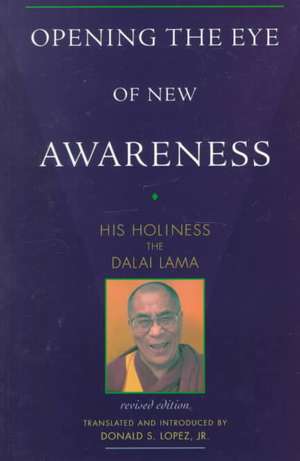Opening the Eye of New Awareness
Autor Dalai Lama, Bstan-'Dzin-Rgy, His Holiness the Dalai Lamaen Limba Engleză Paperback – 31 mai 1984
"Written for both Tibetan and Western readers, "Opening the Eye of New Awareness" is the Dalai Lama's first religious work. It is not an edited transcript of public lectures, but is His Holliness' own summation of Buddhist doctrine and practice. Completed in 1963, just four years after his escape from Tibet and four years after completing his religious education, it is a work of consummate scholarship by a twenty-seven year-old geshe, wise beyond his years. Nowhere in his many subsequent works does one find a more clear and concise exposition of the essentials of Buddhist thought. Indeed, all of His Holinesss's many publications are in some sense commentaries on this first book.
Preț: 81.64 lei
Nou
Puncte Express: 122
Preț estimativ în valută:
15.62€ • 16.35$ • 12.93£
15.62€ • 16.35$ • 12.93£
Carte indisponibilă temporar
Doresc să fiu notificat când acest titlu va fi disponibil:
Se trimite...
Preluare comenzi: 021 569.72.76
Specificații
ISBN-13: 9780861711550
ISBN-10: 0861711556
Pagini: 160
Dimensiuni: 153 x 229 x 14 mm
Greutate: 0.24 kg
Ediția:Revised
Editura: Wisdom Publications (MA)
ISBN-10: 0861711556
Pagini: 160
Dimensiuni: 153 x 229 x 14 mm
Greutate: 0.24 kg
Ediția:Revised
Editura: Wisdom Publications (MA)
Recenzii
"...an excellent and original synopsis of Gelukpa doctrine for serious students of Tibetan Buddhism."—Middle Way
"...a remarkable work, providing a compendium of Buddhist doctrine and practice that is both dense and rich, serving both as a summation of knowledge and as an invitation to further study. Nowhere in his many subsequent works does one find a more clear and concise exposition of the essentials of Buddhist thought. All of His Holiness' many publications are in some sense commentaries on this first book."—Donald S. Lopez, Jr., from his Introduction
"It must be noted that this is not, as in the case of many works attributed to the Dalai Lama, merely an edited transcript of a public lecture, but a complete, singularly authored work introducing the Buddhist doctrines that have been practiced for thousands of years in Tibet... this new translation revitalizes the original teaching while more fully placing it in an historical perspective. A remarkable work worthy of a new look."—NAPRA ReVIEW
"A very highly recommended work of Buddhist scholarship, wisdom, and compassion."—REVIEWER'S BOOKWATCH
"...a remarkable work, providing a compendium of Buddhist doctrine and practice that is both dense and rich, serving both as a summation of knowledge and as an invitation to further study. Nowhere in his many subsequent works does one find a more clear and concise exposition of the essentials of Buddhist thought. All of His Holiness' many publications are in some sense commentaries on this first book."—Donald S. Lopez, Jr., from his Introduction
"It must be noted that this is not, as in the case of many works attributed to the Dalai Lama, merely an edited transcript of a public lecture, but a complete, singularly authored work introducing the Buddhist doctrines that have been practiced for thousands of years in Tibet... this new translation revitalizes the original teaching while more fully placing it in an historical perspective. A remarkable work worthy of a new look."—NAPRA ReVIEW
"A very highly recommended work of Buddhist scholarship, wisdom, and compassion."—REVIEWER'S BOOKWATCH
Descriere
Originally written for Tibetan lay people, this was the Dalai Lama's first book on Buddhist philosophy to appear in English, and Prof. Lopez's new Introduction places these teachings in their proper historical context.
Notă biografică
His Holiness the Dalai Lama is the spiritual leader of the Tibetan people, a Nobel Peace Prize recipient, and a beacon of inspiration for Buddhists and non-Buddhists alike. He has persistently reached out across religious and political lines and has engaged in dialogue with scientists in his mission to advance peace and understanding in the world. In doing so, he embodies his motto, “My religion is kindness.”
Jeffrey Hopkins is Professor Emeritus of Tibetan Buddhist Studies at the University of Virginia, where he taught Tibetan studies and Tibetan language for more than thirty years. He received a BA magna cum laude from Harvard University in 1963, trained for five years at the Lamaist Buddhist Monastery of America (now the Tibetan Buddhist Learning Center) in New Jersey, and received a PhD in Buddhist Studies from the University of Wisconsin-Madison in 1973. From 1979 to 1989 he served as His Holiness the Dalai Lama’s chief interpreter into English on lecture tours in the U.S., Canada, Southeast Asia, Great Britain, and Switzerland. He has published more than twenty-five books, including Meditation on Emptiness, a seminal work of English language scholarship on Tibetan Madhyamaka thought, as well as translations of works by Tsongkhapa, Dolpopa, and His Holiness the Fourteenth Dalai Lama. At the University of Virginia he founded programs in Buddhist Studies and Tibetan Studies and served as Director of the Center for South Asian Studies for twelve years.
Jeffrey Hopkins is Professor Emeritus of Tibetan Buddhist Studies at the University of Virginia, where he taught Tibetan studies and Tibetan language for more than thirty years. He received a BA magna cum laude from Harvard University in 1963, trained for five years at the Lamaist Buddhist Monastery of America (now the Tibetan Buddhist Learning Center) in New Jersey, and received a PhD in Buddhist Studies from the University of Wisconsin-Madison in 1973. From 1979 to 1989 he served as His Holiness the Dalai Lama’s chief interpreter into English on lecture tours in the U.S., Canada, Southeast Asia, Great Britain, and Switzerland. He has published more than twenty-five books, including Meditation on Emptiness, a seminal work of English language scholarship on Tibetan Madhyamaka thought, as well as translations of works by Tsongkhapa, Dolpopa, and His Holiness the Fourteenth Dalai Lama. At the University of Virginia he founded programs in Buddhist Studies and Tibetan Studies and served as Director of the Center for South Asian Studies for twelve years.
